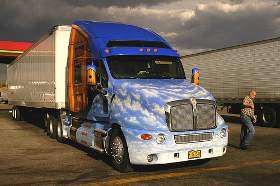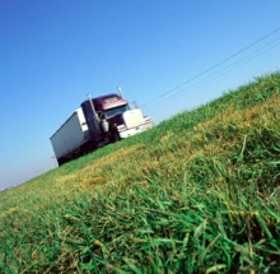Wanting To Become An Owner/Operator
Topic 28820 | Page 2
You do not make more money unless you are extremely experienced as an owner operator and decided to put the work in for the first five years making less money than a company driver. More money into a bank account does not mean more money into your pocket. I don’t think you understand the costs. You have payments to make as an owner operator regardless of whether you drive or not. My monthly overhead just for the truck to sit without fuel for my wife and self is about $9000 ( before taxes we only pay ourselves a total of $2650, after taxes you are responsible for both portions so you have to add $900 a month that just goes away never to be seen again) If you don’t pay your insurance just one Month, you lose your operating authority. .
Hello Laura,
I must inform you that I do have some experience. I do not have OTR experience but I have been a company, local driver for 16yrs. I am aware of the cost of being an OO but in the long run I thought they make more money and you have a lot more say so over what you will and will not do.
OTR:
Over The Road
OTR driving normally means you'll be hauling freight to various customers throughout your company's hauling region. It often entails being gone from home for two to three weeks at a time.
Owner Operator:
An owner-operator is a driver who either owns or leases the truck they are driving. A self-employed driver.
You go through more money, however that is gross not takehome.
Your list is a bit different in what your going to haul. You will go broke hauling amazon. That is cheap freight. I know they are not very picky and will just about give a contract to anyone.
The only way I would buy a day cab is to run completely local. Too many things can happen running regional where you would rack up alot of hotel costs.
Under my own authority, I would have to have a contract in place with a customer with a decent rate. Brokers are not the way to go. Being a new owner, that can be very hard to get.
Plus you have alot of reporting to do. Are you familiar with those??
I run leased onto my company. I get my insurance thtough them which is a little less than half what I could buy it on my own. That is huge. Also they supply the loads, trailers, and front office support. I also tun their fuel card and get savings there.
It will cost you a minimum of around 30k to get started under your own authority and that is on the cheaper side. That doesn’t count for having money in the bank for repairs when they occur. You will make more on the front end than a company driver, but by the time you acvomplish all the other necessary things it will bring you back to company drivers wages, with alot more headaches. A breakdown or miss filing your required paperwork on time you will make less and possibly get shutdown by dot.
There is much more to owning a truck and running a business than just driving. It can get complicated and expensive.
Regional:
Regional Route
Usually refers to a driver hauling freight within one particular region of the country. You might be in the "Southeast Regional Division" or "Midwest Regional". Regional route drivers often get home on the weekends which is one of the main appeals for this type of route.
Day Cab:
A tractor which does not have a sleeper berth attached to it. Normally used for local routes where drivers go home every night.
DOT:
Department Of Transportation
A department of the federal executive branch responsible for the national highways and for railroad and airline safety. It also manages Amtrak, the national railroad system, and the Coast Guard.
State and Federal DOT Officers are responsible for commercial vehicle enforcement. "The truck police" you could call them.
DAC:
Drive-A-Check Report
A truck drivers DAC report will contain detailed information about their job history of the last 10 years as a CDL driver (as required by the DOT).
It may also contain your criminal history, drug test results, DOT infractions and accident history. The program is strictly voluntary from a company standpoint, but most of the medium-to-large carriers will participate.
Most trucking companies use DAC reports as part of their hiring and background check process. It is extremely important that drivers verify that the information contained in it is correct, and have it fixed if it's not.
HOS:
Hours Of Service
HOS refers to the logbook hours of service regulations.
Hi duane,
Let me give you some direction. Buying the truck is the LAST step in starting a trucking company. You need to make sure the loads you want to pull are readily available, you need to be sure you can afford the overhead, you need to understand the back office side of trucking.
FedEx freight is basically all dedicated contact freight. You will not be able to find their loads to pull unless you lease on with someone that has a contract with them. Amazon requires you to have 2 million auto liability, which is more than double the insurance needed to pull freight on the spot market.
If you're serious about going out on your own I'd suggest to find someone that's doing similar to what you want to be doing, and writing out a business plan wouldn't hurt. Good luck.

Thank you for all the advice. I will take it all into consideration and weigh my options. However I did know about some of the overhead stuff like insurance, truck maintenance, fuel cost and etc. I knew I would have to put money back or in a special account for that stuff because I would likely be responsible for that. I had heard about (your own authority) but don't know how that works. All in all I appreciate all the comments it will take them all into consideration. Thank you, Dtrain
PJ Moderator,
Yes I have been driving for 16yrs. I will say I do not have OTR exp. but I have been local for 16yrs. I believe I would l haul flooring products such as carpet, backing, yarn, hard wood, etc. or maybe pull for Amazon or FedEx. Something like that. As of right now I am thinking I would just want a daycab to run locally or regional.
I don't know how Amazon works, but I do know how FedEx ground works. You can't just pull for them, you have to buy that contract and they usually cost around 100K depending on the lanes. I'd be surprised if FedEx has any open lanes, which means that you would have to buy that business from a contractor.
Regional:
Regional Route
Usually refers to a driver hauling freight within one particular region of the country. You might be in the "Southeast Regional Division" or "Midwest Regional". Regional route drivers often get home on the weekends which is one of the main appeals for this type of route.
OTR:
Over The Road
OTR driving normally means you'll be hauling freight to various customers throughout your company's hauling region. It often entails being gone from home for two to three weeks at a time.
Amazon pays so little they have a hard time getting people to do it, coupled with unrealistic delivery windows and I do not think they would be a good company to pull for.
I'd pull containers before I pulled anything for Amazon. Not sure if the current cost of insurance has been mentioned. That is hurting companies big time. Factors like rising cost of tolls. Even a tire can be an absolutely insane expense. I have a screenshot of a receipt from Love's I'll have to find from a few weeks ago. Grand total of 830 dollars for one trailer tire. One. It was the customers trailer so didn't cost us any. These are all things you have to consider. And hope you are mechanically inclined and know when you are being ripped.
Amazon pays so little they have a hard time getting people to do it, coupled with unrealistic delivery windows and I do not think they would be a good company to pull for.
When all this pandamic stuff started my company told us if our freight dropped of, their babup plan was to haul for walmart and amazon. My DM told me if I wanted to volunteer to do it I could, but I would go broke pulling for amazon. He didn’t give me any specific rates, and I didn’t ask. I felt if he was warning me it must be a bad idea. There are old trucks pulling amazon trailers all over with paper cab cards attached to the windshield. This means it was just purchased. Names on the doors are ones that appear to be new. That tells me they are giving many new O/O a shot.
Dm:
Dispatcher, Fleet Manager, Driver Manager
The primary person a driver communicates with at his/her company. A dispatcher can play many roles, depending on the company's structure. Dispatchers may assign freight, file requests for home time, relay messages between the driver and management, inform customer service of any delays, change appointment times, and report information to the load planners.
This topic usually generates a robust discussion. I'm sprinkling some Meat Church BBQ Holy Voodoo on the popcorn tonite... 
New Reply:
New! Check out our help videos for a better understanding of our forum features

















Preview:
This topic has the following tags:
Owner Operator Truck Driver Salary Truck Maintenance







 TT On Facebook
TT On Facebook
PJ Moderator,
Yes I have been driving for 16yrs. I will say I do not have OTR exp. but I have been local for 16yrs. I believe I would l haul flooring products such as carpet, backing, yarn, hard wood, etc. or maybe pull for Amazon or FedEx. Something like that. As of right now I am thinking I would just want a daycab to run locally or regional.
Regional:
Regional Route
Usually refers to a driver hauling freight within one particular region of the country. You might be in the "Southeast Regional Division" or "Midwest Regional". Regional route drivers often get home on the weekends which is one of the main appeals for this type of route.
OTR:
Over The Road
OTR driving normally means you'll be hauling freight to various customers throughout your company's hauling region. It often entails being gone from home for two to three weeks at a time.